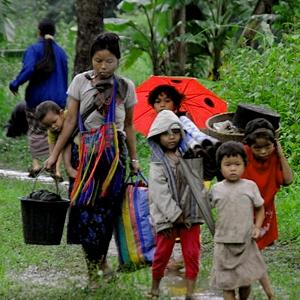分享到
This is the VOA Special English Health Report.
In the past year, Burma has opened its political system and reached cease-fire agreements with some ethnic militias. The government has also eased media restrictions. But many aid groups say their jobs have not gotten any easier.
Health workers are warning about the spread of a form of drug-resistant malaria. The malaria is resistant to treatment with artemisinin. It was first seen several years ago in Cambodia.
Frank Smithuis started a group called Medical Action Myanmar. He says even with the recent political openings, aid organizations still find it difficult to gain access to areas most in need of aid. This is true, he says, especially in areas torn by many years of conflict along Burma's eastern border.

In the past, many nongovernmental organizations simply worked without official approval. Lower-level government officials largely ignored organizations that did not follow the rules.
Until 2009, just three international nongovernmental aid organizations had the required approvals to operate inside Burma. Yet more than 100 were operating there. Many were able to get a memorandum of understanding that allowed them to work without an official registration.
But then came the recent political changes. Heads of aid organizations say lower-level officials are now unclear about their powers and responsibilities. In many cases they are enforcing the requirements more closely.
Save the Children is an aid organization whose work is mostly related to mother and child health in Burma. Kelland Stevenson with Save the Children says, in general, ministries and government workers have become much more cooperative. He agrees with those who say the barriers that humanitarian workers now face are largely bureaucratic.
KELLAND STEVENSON: "It shouldn't be a political discussion. There remains a bit of command and control from government, and it's not going to open up overnight. And the discussion about getting access to new areas is under way. You have to remember these changes have been extraordinarily dramatic in such a short time. I mean, we're talking a year."
Kelland Stevenson says "things are changing so quickly." Still, aid groups warn that some issues -- such as the drug-resistant malaria -- may only get worse unless the government also takes action quickly.
And that's the VOA Special English Health Report. For more health news for people learning English, go to voaspecialenglish.com. I'm Jim Tedder.
militia: an army composed of ordinary citizens rather than professional soldiers 民兵組織
artemisinin: 青蒿素
WHO chief says world faces three growing threats
(來源:VOA 編輯:旭燕)
分享到
關(guān)注和訂閱


翻譯
關(guān)于我們 | 聯(lián)系方式 | 招聘信息
電話:8610-84883645
傳真:8610-84883500
Email: languagetips@chinadaily.com.cn